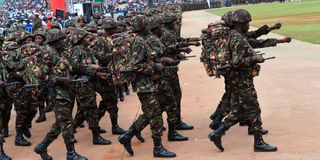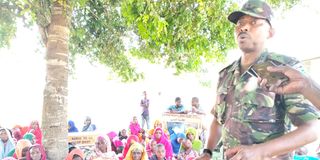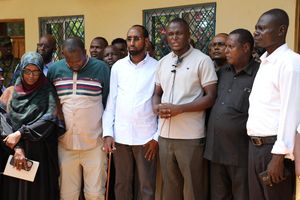
National Intelligence Service Director-General Noordin Haji before a parliamentary committee at Bunge Tower in Nairobi on May 12, 2025.
National Intelligence Service (NIS) Director-General Noordin Haji went emotional before MPs on Monday, lamenting how inadequate funding of Kenya Defence Forces (KDF) to enable acquisition of modern weaponry is exposing the country’s borders to external aggressors.
Mr Haji spoke before the Defense and Foreign Relations committee of the National Assembly as he pushed for a Sh51.45 billion budget for NIS for the 2025/26 financial year.
At one point, Kajiado Central MP Elijah Memusi, who demanded that Mr Haji explain what Kenyans got from the huge NIS allocations, wondered why it was proper for the NIS boss to reveal sensitive information to the public, saying it will expose the country more.
But Mr Haji, who shouted back saying that the country will not gain anything from those “politicising everything,” including allocations to NIS, said it's time the country was told the truth.
“We cannot beat around the bush. Let’s not lie to Kenyans,” said Mr Haji as he told the committee that the country is only safe on the border with Tanzania. The borders with other neighbouring countries are porous, and foreign militias have invaded the country to cause anarchy, he observed.
“As a country, we need to be serious. There are threats from each of our neighbours except Tanzania. If our neighbours fail, we are in trouble,” Mr Haji said, adding that the situation in Yemen compounds the regional threats to Nairobi.
Infiltration by insurgents
The NIS boss went on to reveal that the country’s borders with Ethiopia, Uganda, South Sudan and Somalia are specifically facing threats of infiltration by insurgents from the neighbouring countries, a situation he says requires a well-funded and equipped KDF to confront.

Kenya Defence Forces.
Mr Haji told the committee that the Oromo Liberation Army (OLA), a dangerous armed opposition group in the Oromia region of Ethiopia, pushing for self-determination, has occupied parts of the Kenyan territory from where it is launching its terror activities.
The militia group has been causing havoc in Northern Kenya, which has seen innocent Kenyans in the region killed. On February 22, militia from Ethiopia attacked Todonyang in Turkana and committed what is believed to be a massacre, as dozens of people have been missing since. For days, security chiefs could not access the scene of crime despite it being within the country’s borders.
The NIS boss also noted that small arms used for criminal activities in the country have been smuggled across the South Sudan border, with gun runners exploiting the volatile situation in the neighbouring country.
This even as the spy chief noted that the al-Shabaab insurgents continue to infiltrate the country along the Somalia border and inflict terror on Kenyans and State installations.
On May 2, five police officers were shot dead by al-Shabaab militants at Boni Forest, Lamu. The attack came three days after the terrorists had killed five quarry workers in Mandera.
Earlier on February 3, five chiefs were abducted by al-Shabaab terrorists in Mandera. They were released on April 7 after a deal brokered by elders believed to have included payment of ransom money.
On March 15, more than 100 heavily armed al Shabaab militia raided Mangai village in Lamu and lectured residents for hours.

Lieutenant-General Juma Mwinyikai addressing residents of Mangai Village in Boni Forest, Lamu County, during a security tour on January 26, 2023. On March 15, 2025, Al-Shabaab militants invaded Mangai Village, preaching to the locals before distributing dates as Ramadhan gifts.
The Karamojong from Uganda have also been rampant, causing raids in Kenya’s North Rift region- killing Kenyans and stealing herds of cattle.
On February 23, 2023, a joint contingent of KDF and police was deployed in Baringo, Elgeyo Marakwet, West Pokot, Samburu and Laikipia under Operation Maliza Uhalifu to fight bandits.
The proposed NIS allocation is a reduction from Sh65.7 billion NIS had originally requested before it was reduced to Sh52.5 billion in the Budget Policy Statement (BPS) that was approved by the National Assembly.
Mr Haji is rarely available before the committees of parliament when required to respond to issues of national interest and MPs have shied away from summoning him even when a need arises.
But Monday, the ever-elusive NIS boss made a passionate plea to MPs to support security agencies as he sought public sympathy, which has rarely been extended to security agencies lately because of accusations of extrajudicial killings and enforced disappearances of government critics.
Mr Haji said it is time the country got to know the dangers it’s exposed to given the prevailing inadequate funding from the exchequer.
For the first time, the media was headhunted on instructions from the NIS boss to cover the committee that has largely conducted its business behind closed doors.
“The current threat environment we are facing as a country is dire. It is wanting. To be frank, there is more that needs to be done. The military has not been getting the required equipment for the last 10 years to enable it to do its job sufficiently,” said Mr Haji.
But when Belgut MP Nelson Koech sensed that Mr Haji was revealing too much information, he ejected journalists from the meeting without the concurrence of the committee members and without the request of the witness.

Belgut MP Nelson Koech.
Still Mr Haji was not questioned by the committee on the enforced disappearances and abduction of Kenyans, given he has been adversely mentioned by immediate former Attorney-General Justin Muturi.
Mr Muturi, who would later be appointed Public Service Cabinet Secretary and then sacked by President Ruto, has openly accused the Haji-led NIS of abducting his son. The CS’s public demands that abductions and killings following last June’s GenZ protests be discussed by the Cabinet led to his sacking.
The committee did not also interrogate Mr Haji on the potential threats emanating from Kenya’s role in the Sudan conflict as well as the instability in Democratic Republic of Congo.
The Sudanese government recently wrote to the Kenyan Parliament demanding that it exert pressure on President Ruto to refrain from meddling in Khartoum internal matters.
Sometimes back, the rebel movement in Congo DRC launched its operations in Nairobi to the dislike of the Kinshasa government.
KDF is one of the largest consumers of the intelligence generated by NIS.
Interestingly, KDF Vice Chief of the Defense Forces (VCDF) Lt. Gen. John Mugaravai, who had accompanied Defense PS Patrick Mariru before the committee over the 2025/26 budget just before Mr Haji appeared, did not raise a red flag over KDF’s lack of adequate funding to buy modern equipment.

Defence Principal Secretary Patrick Mariru (left) and KDF Vice Chief of the Defense Forces Lt. Gen. John Mugaravai before the National Assembly Public Accounts Committee at Bunge Tower in Nairobi on February 5, 2025.
In the financial year that starts July 1, 2025, the Department of Defence has been allocated Sh200.3 billion, which largely goes to the payment of salaries for the soldiers.
The budget, which is a reduction from the Sh204 billion allocated in the current financial year, includes Sh195 billion in recurrent expenditure and Sh4.9 billion development.
Defending the NIS budget, Mr Haji told the committee that the spy man needs the funds to modernize operations.
Of the NIS billions, Sh10 billion will go towards operations and maintenance, Sh5.5 billion for the modernisation of intelligence, multisectoral security operations Sh2.5 billion, Sh1 billion for recruitment of personnel.
NIS also intends to acquire Unmanned Aerial Vehicles (UAVs), among other equipment for aerial and ground surveillance to cost Sh2.5 billion with research and development allocated Sh1 billion.
The intelligence modernisation programme entails upgrading and acquisition of modern security system tools as well as capacity building.
But Mr Koech told the NIS boss that his committee has been extremely generous and always granting budgetary allocations as requested by NIS.
“This committee has been so kind to you. Against your requirement, you have been getting almost everything you request,” said Mr Koech.
In the 2020/21 financial year, NIS was allocated Sh45 billion, which increased by over Sh2 billion in the subsequent fiscal period before reducing by about Sh10 billion in the 2022/23 financial year.
In the 2023/24 financial year, the budget was Sh45 billion before shooting to Sh55 billion in the current financial year.






